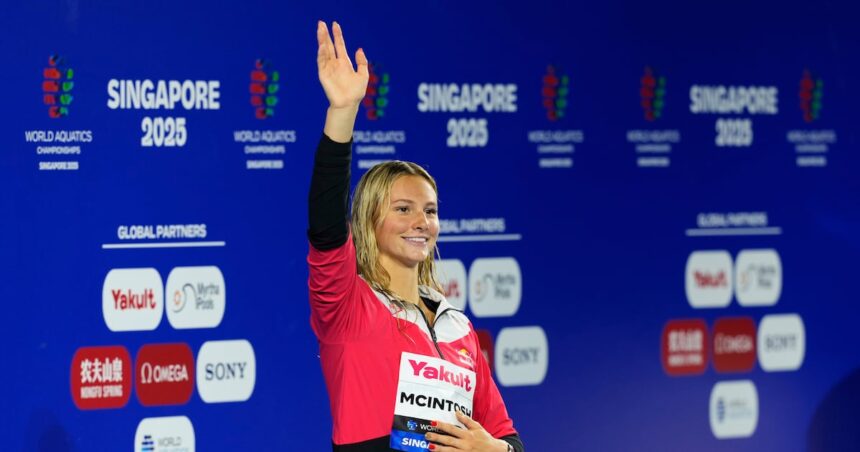The lights of the Doha Aquatics Center dimmed momentarily before illuminating the pool where 18-year-old Summer McIntosh had just shattered expectations—and nearly a world record—securing her second gold medal at the 2025 World Swimming Championships. The Canadian phenom touched the wall in the women’s 400m individual medley with a championship record time that left competitors and spectators alike in awe of what we’re witnessing: the continued rise of swimming’s most formidable young talent.
McIntosh’s dominance in the water feels almost predetermined at this point. Her victory in the 400m IM comes just two days after she claimed gold in the 200m butterfly, displaying a versatility that has become her signature. As I watched the race unfold from the press section, what struck me wasn’t just the technical brilliance of her swimming—though that was evident in every stroke—but the composed determination etched across her face. This wasn’t the performance of a teenager; it was the calculated execution of an athlete who has already mapped her path to greatness.
“The plan was to maintain control through the butterfly and backstroke, then push the pace on breaststroke,” McIntosh told reporters afterward, her voice steady despite having just completed one of swimming’s most grueling events. “I felt strong coming home on freestyle.” This understated assessment belies the extraordinary nature of her achievement—finishing nearly four seconds ahead of her closest competitor, Japan’s Yui Ohashi.
Canadian swimming has undergone a remarkable transformation in recent years. What was once a program that celebrated occasional Olympic medals has evolved into a powerhouse that consistently produces world-class talent. McIntosh stands at the forefront of this renaissance, alongside Olympic medalists Penny Oleksiak and Kylie Masse, forming the backbone of what Swimming Canada’s high-performance director John Atkinson calls “the strongest team in our history.”
The significance of McIntosh’s accomplishments extends beyond medal counts. At just 18, she represents a new archetype in elite swimming—athletes who combine technical perfection with a scientific approach to training and recovery. Her coach, Ryan Mallette, has spoken frequently about McIntosh’s exceptional ability to process feedback and implement adjustments, sometimes within a single training session. “Summer’s greatest strength might be her adaptability,” Mallette noted earlier this year. “She absorbs information like few athletes I’ve ever coached.”
This adaptability was on full display in Doha. After a slightly underwhelming preliminary swim by her lofty standards, McIntosh adjusted her approach for the final, particularly in the breaststroke leg—traditionally considered her “weakest” stroke, though that term seems increasingly inappropriate given her performance.
The evolution of McIntosh’s career has been anything but conventional. While many elite swimmers peak in their early twenties, she has been rewriting expectations since bursting onto the international scene at 14. Her trajectory has been compared to that of Katie Ledecky, the American superstar who revolutionized women’s distance freestyle swimming. But such comparisons, while flattering, fail to capture what makes McIntosh unique: her exceptional versatility across multiple strokes and distances.
What’s perhaps most intriguing about McIntosh is what remains ahead. Swimming analysts suggest she hasn’t yet reached her physical prime, a thought that must send shivers through her competitors. With the 2028 Los Angeles Olympics looming on the horizon, the question isn’t whether McIntosh will be a force—it’s how many events she might dominate.
For Canada, a country that has historically played second fiddle to swimming superpowers like the United States and Australia, McIntosh represents more than individual achievement. She embodies the potential of a program that has invested heavily in identifying and developing young talent. As I’ve covered the CO24 Culture of sports development in Canada, it’s become evident that McIntosh’s success is both exceptional and systematic—the product of personal brilliance and institutional excellence.
The CO24 Trends in elite swimming point toward increasingly specialized training from younger ages, but McIntosh defies this pattern with her all-around excellence. Her ability to excel across multiple events suggests a more holistic approach to development—one that prioritizes fundamental skills over early specialization.
As McIntosh stood atop the podium in Doha, the Canadian anthem playing throughout the venue, the moment transcended sport. It represented the continuing evolution of a young athlete whose ceiling remains unknown. In my years covering international swimming, I’ve witnessed the emergence of several generational talents, but few have combined McIntosh’s technical proficiency, competitive instinct, and room for growth.
The championships continue tomorrow, with McIntosh scheduled to compete in two more events. Based on what we’ve seen so far, it would be foolish to bet against her adding to her medal haul. But regardless of the outcome, what Summer McIntosh has already accomplished in Doha confirms what many in the swimming world have suspected: we are watching the emergence of an athlete who may define her sport for years to come. And for Canadian swimming, that prospect is golden indeed.
For more CO24 Opinions on emerging athletic talent and Canada’s growing presence in international sports, follow our ongoing coverage of the 2025 World Swimming Championships.























